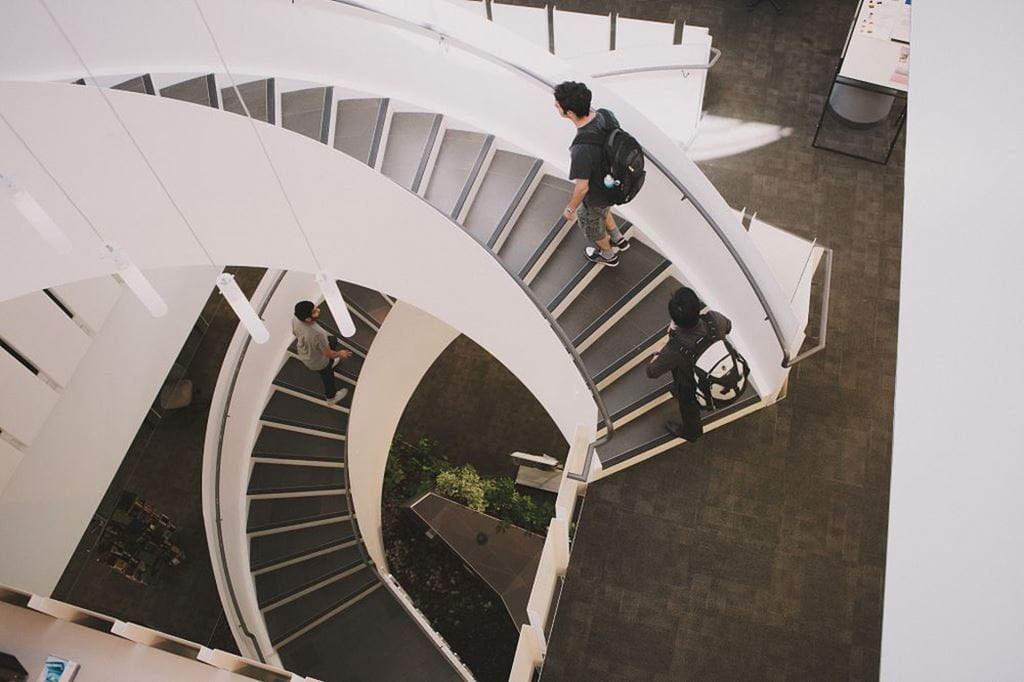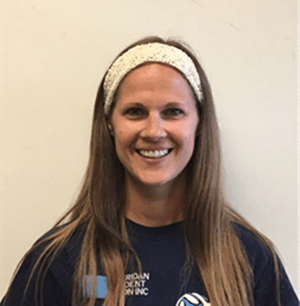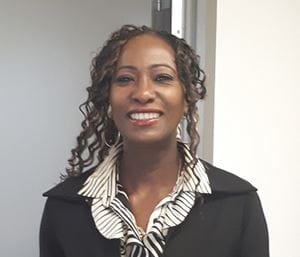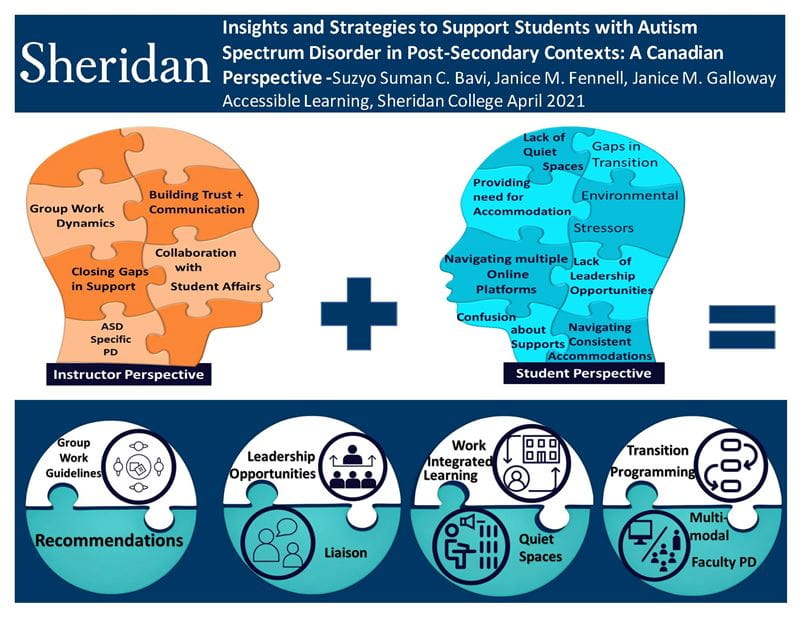
Sheridan research works to support students with autism spectrum disorder
 by Meagan Kashty – Feb 15, 2022
by Meagan Kashty – Feb 15, 2022 An increasing number of students with autism spectrum disorder (ASD) are pursuing postsecondary education and a group of Sheridan researchers is working to make sure colleges are ready to support them.
 Strategies to Support Students with Autism began when Learning Strategist Janice Galloway and Counsellor Suzyo Suman Bavi noticed that students with ASD were struggling more than their typically developing peers. Students with ASD can have difficulties with communication and social deficits, explains Galloway, that can result in rigid, repetitive behaviours and interests.
Strategies to Support Students with Autism began when Learning Strategist Janice Galloway and Counsellor Suzyo Suman Bavi noticed that students with ASD were struggling more than their typically developing peers. Students with ASD can have difficulties with communication and social deficits, explains Galloway, that can result in rigid, repetitive behaviours and interests.
The number of students with ASD entering postsecondary institutions has been increasing steadily over the last three years. In 2018, 169 students registered with Sheridan with ASD as a diagnosis, the most of any college in the GTA and the second-most in Ontario. By 2020, Sheridan had a 15% increase in the overall students that registered.
 Galloway and Bavi could see the academic and social challenges these students faced every day, leading to higher rates of mental health challenges and lower graduation rates.
Galloway and Bavi could see the academic and social challenges these students faced every day, leading to higher rates of mental health challenges and lower graduation rates.
“It’s such an underrepresented group of students, and they have a lot of unique needs that aren’t addressed and are still in some ways unknown or misinterpreted,” explains Galloway. “That’s why we wanted to delve into this research more from a student perspective.” When it comes to faculty, Bavi says he often gets requests from instructors asking how they can support students on the autism spectrum.
 Formal research into supporting students with ASD took off in 2019 when Janice Fennell became Sheridan’s Manager of Accessible Learning. The trio – with the help of a Scholarship, Research and Creative Activities Growth Grant and support from the Accessible Learning and Wellness & Counselling teams – produced a research report examining the needs of students with ASD at Sheridan, focusing on the tools and supports faculty can provide to help these students succeed.
Formal research into supporting students with ASD took off in 2019 when Janice Fennell became Sheridan’s Manager of Accessible Learning. The trio – with the help of a Scholarship, Research and Creative Activities Growth Grant and support from the Accessible Learning and Wellness & Counselling teams – produced a research report examining the needs of students with ASD at Sheridan, focusing on the tools and supports faculty can provide to help these students succeed. Through focus groups, the research team was able to isolate some of the key stressors for students with ASD and identify some of the challenges in their learning experiences.
For example, students reported they felt there was a lack of leadership opportunities within the college and wanted creative opportunities for their voices to be heard. “Many students with ASD can feel isolated when they first enter postsecondary,” explains Galloway. “Clubs such as FACE IT (Friends Accepting Challenges and Endeavouring to Improve Themselves) help them identify themselves and promote understanding and acceptance.” Since 2012, Galloway and Bavi have co-facilitated FACE IT — a Sheridan Student Union led club for students and alumni with ASD, empowering members by providing a safe space to self-advocate.
The students also said they struggled when having to navigate different processes and procedures within their classes. This challenge has been exacerbated by the pandemic, with instructors using multiple digital platforms such as Teams, Zoom and WebEx in the pivot to virtual learning.
Fennell says she was surprised to see the number of faculty participants who volunteered to participate in the research study far outweighed the number of students. It was evidence that these instructors are heavily invested in the success of their students – and that they were more than willing to adapt their teaching style and delivery if it meant one of their students would benefit.
“Creating an environment in which our students feel comfortable and heard by their professors helps alleviate so much of the stress that comes from the transition from high school to college – no matter the circumstance.”
– Janice Galloway, Learning Strategist
To help pass on their learnings, Fennell, Galloway and Bavi have been holding virtual workshops to share their findings, recommendations, and information about the resources and tools needed to effectively support students with ASD in the classroom.
Fennell, Galloway and Bavi were also able to identify recommendations in their research plans to help faculty in the future which includes interactive and in-person training sessions, as well as the development of a toolkit.
For students, the team is looking into creating designated safe spaces on campus and developing more leadership opportunities for students. Also on tap is a creation of guidelines and accommodation for group work to mitigate stressors experienced by students with ASD in the teaching and learning environment.
“At its core, creating these tools and developing these programs is about building trust and facilitating communication between students with ASD and their instructors,” says Galloway. “Creating an environment in which our students feel comfortable and heard by their professors helps alleviate so much of the stress that comes from the transition from high school to college – no matter the circumstance.”
Click here to download the report Strategies to Support Students with Autism
Learn more about Sheridan’s Accessible Learning Services.
If you’d like to speak to one of the authors of the report, please email communications@sheridancollege.ca.
Pictured: Janice Galloway (Learning Strategist), Suzyo Suman Bavi (Counsellor), Janice Fennell (Manager of Accessible Learning).
Media Contact
For media inquiries, contact Sheridan’s Communications and Public Relations team.






